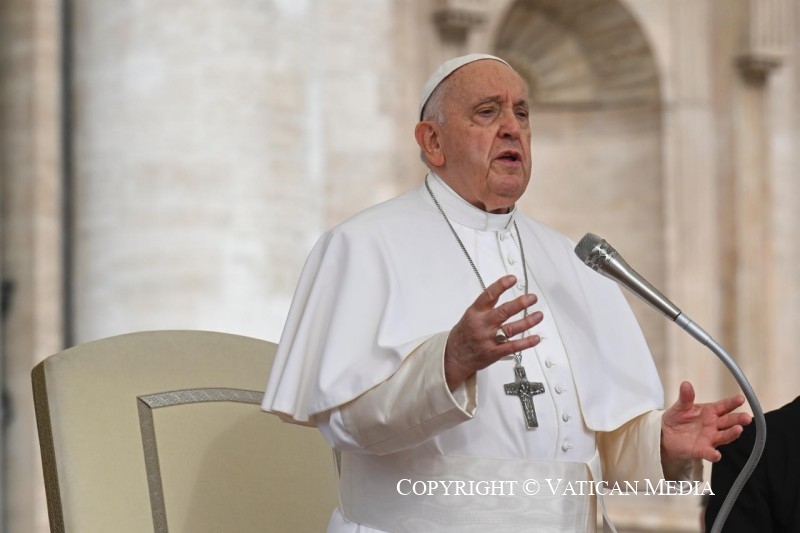Pope: 'Silence weapons in Nagorno Karabakh'
Francis' appeal at the general audience for the Caucasus once again plunged into violence. On the table is a ceasefire between Azeris and Armenians brokered by Moscow that would include the surrender of the Armenian government in the enclave. The catechesis in St. Peter's Square dedicated to the figure of St. Daniel Comboni, apostle of Africa. From the pontiff a new denunciation against slavery and colonialism "which are not just a memory of the past".
Vatican City (AsiaNews) - An appeal to all the parties involved and to the international community to stop the renewed fighting between Azeris and Armenians in the disputed region of Nagorno Karabakh. Pope Francis made this appeal today from St. Peter's Square addressing the faithful at the end of his Wednesday audience.
Before once again renewing his call to prayer for the war-wounded Ukraine, the pontiff also voiced his concern for the conflict in the South Caucasus, which has flared up again in the last few hours after months of suffering caused by the Azerbaijani army's blockade of the Lačin corridor, the only link between the enclave and Armenia.
"The already critical humanitarian situation is now aggravated by further armed clashes," Francis said, referring to yesterday's tragic news. "I address my appeal to all the parties involved and to the international community to put down arms and make every effort to find peaceful solutions for the good of the people and respect for human dignity.
The appeal comes as a ceasefire brokered by Moscow has been announced: among the terms would be the dissolution of the Armenian local government within the enclave. But the situation remains very tense and the toll of the fighting in recent hours is heavy: Armenian sources speak of at least 27 dead and more than 200 wounded. The patriarchate of Etchmiadzin has announced that a priest from the Dadivank monastery was also wounded under Azerbaijani artillery fire and is being transported to hospital.
Prior to the appeal for peace in the Caucasus - continuing the cycle of catechesis dedicated to the theme of apostolic zeal in evangelisation - Pope Francis had dedicated his reflection to another great mission witness: the Italian bishop Saint Daniele Comboni (1831-1881), an "apostle full of zeal for Africa". "Of those peoples he wrote: 'they have taken possession of my heart that lives only for them', 'I will die with Africa on my lips'. It is beautiful!" the pontiff commented.
Francis recalled Comboni's profound awareness of the evil represented by slavery in Africa.
"Slavery 'cosifies' man," the pope commented, "whose value is reduced to being useful to someone or something. But Jesus, God made man, elevated the dignity of every human being and unmasked the falsity of all slavery."
"But slavery, like colonialism,' he added, quoting the words he spoke in January during his apostolic journey to the Democratic Republic of Congo, 'unfortunately are not a thing of the past. In the Africa so beloved by Comboni, today torn apart by many conflicts, after the political one, an economic colonialism, equally enslaving, has been unleashed. It is a drama before which the economically more advanced world often closes its eyes, ears and mouth. I therefore renew my appeal: stop suffocating Africa: it is not a mine to be exploited or a land to be plundered'.
"Save Africa with Africa," said St Daniel Comboni. "It is a powerful intuition," Francis commented, "that contributed to renewing missionary commitment: the people evangelised were not just 'objects', but 'subjects' of the mission. And citing the promotion of the lay service of catechists, he called them "a treasure of the Church".
Even today," he added, "it is necessary to take the path of evangelisation from the culture of peoples. Evangelising culture and inculturating the Gospel: they go together'.
For Francis, Saint Daniel Comboni 'bears witness to the love of the Good Shepherd, who goes out to seek the lost and gives his life for the flock. His zeal was energetic and prophetic in opposing indifference and exclusion. Comboni's dream is a Church that makes common cause with the crucified of history, to experience the resurrection with them'.
Hence the invitation to the faithful: "Think of the crucified of history today: men, women, children, old people who are crucified by stories of injustice and domination. Let us think of them and pray. Do not forget the poor, for it is they who will open the door to Heaven for you'.
12/02/2016 15:14







.png)










